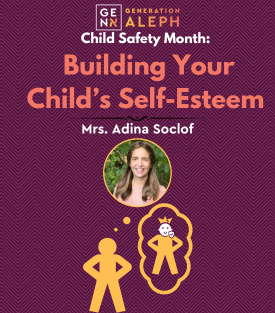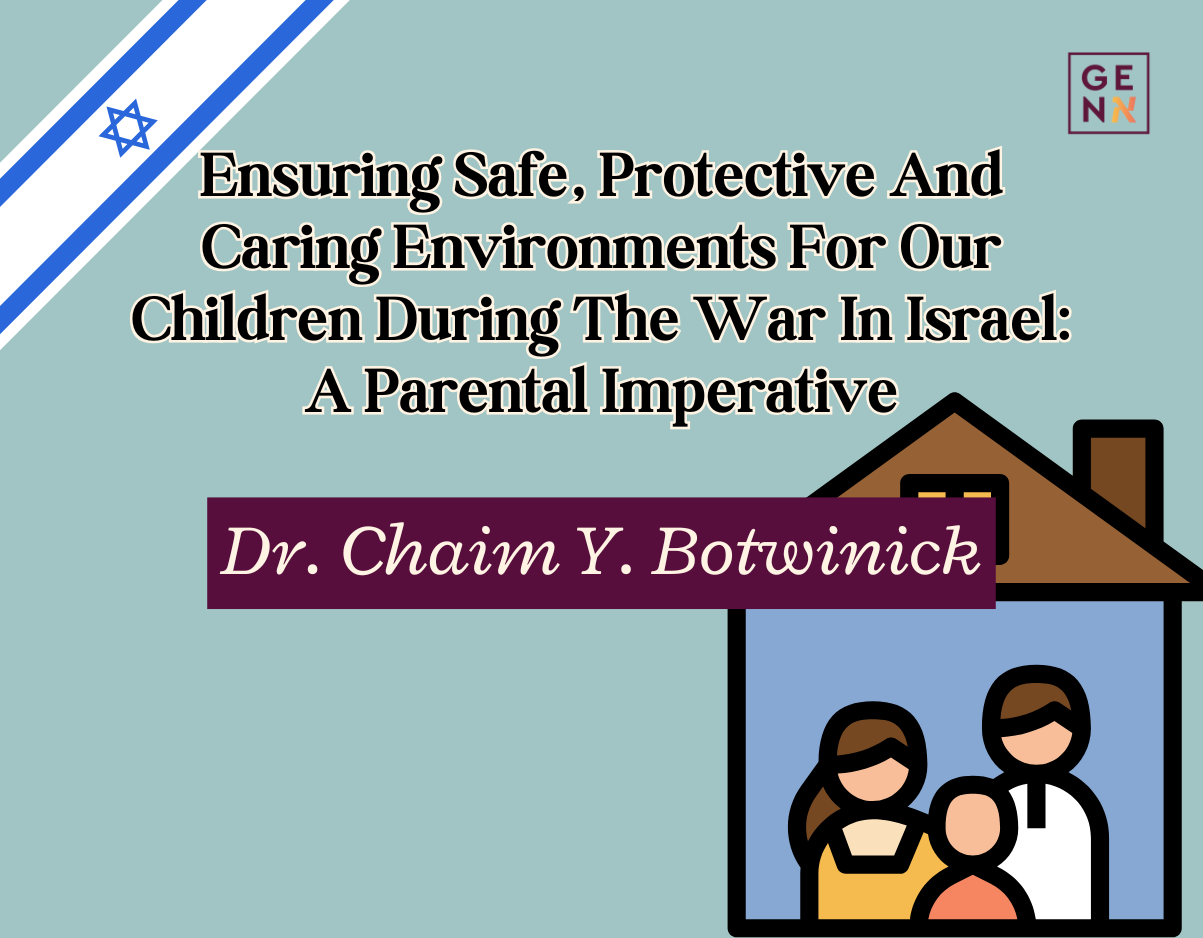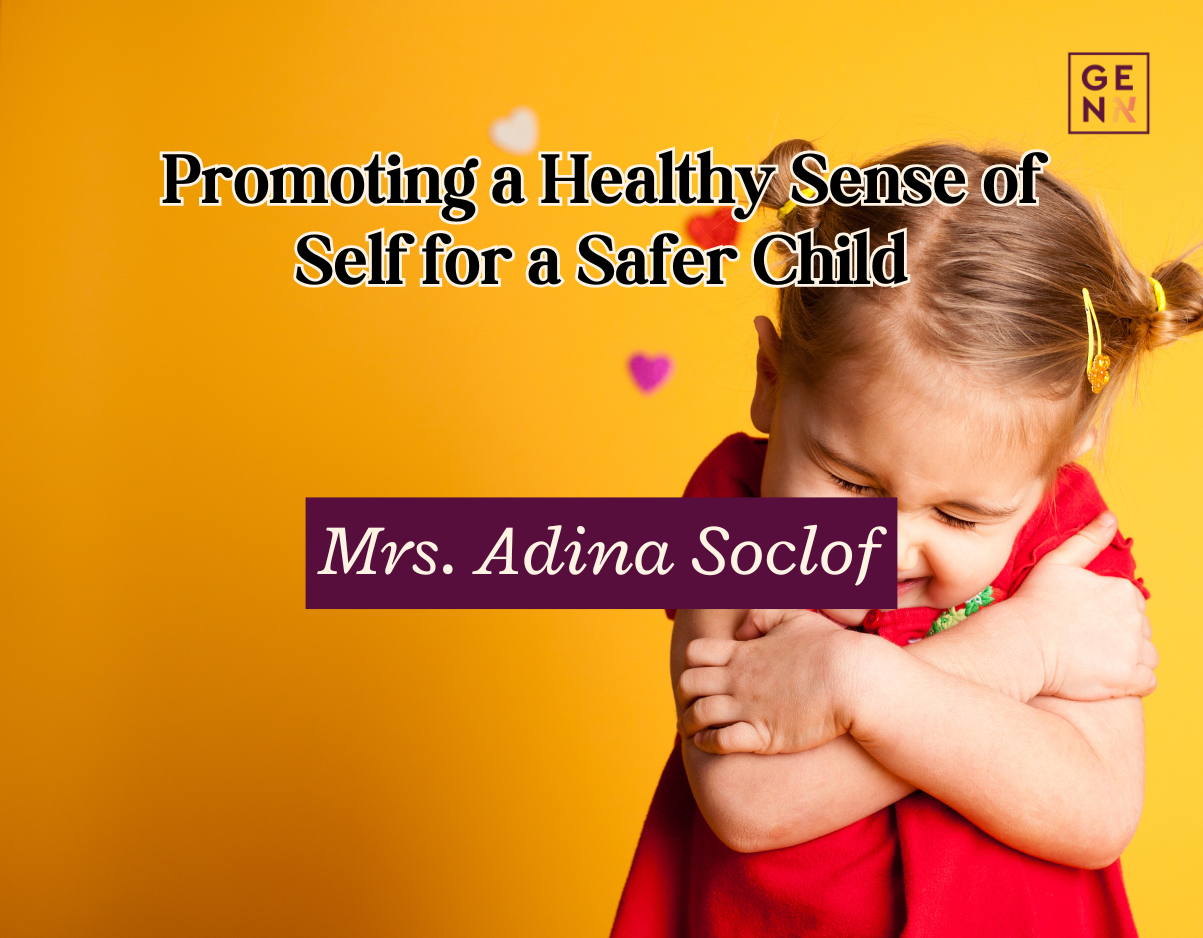This month is safety awareness month at GenAleph.org. One of the most important, but often overlooked aspects of keeping children is safe, is to make sure that they have a healthy sense of self. Children who have a positive self-image are less likely to be preyed upon.
Here are 7 simple ways to help children develop healthy self-esteem:
- Parents Matter:
Children need to know that they are loved for who they are. They need to be cherished and valued for their natural abilities and strengths. Don’t underestimate the power of being your child’s biggest fan and supporter. When children have unconditional love, they learn to be independent, confident and responsible.
- Hear them out:
We need to make sure that our children know that they matter. We need to put down our phones and really listen to our children. There are times where are children need our undivided attention, when they come home from school, dinner time and bedtime. That is usually when children talk about their day, their fears and their challenges. We want to make sure that they have the time to unload. We want to make sure that they are processing their day, with us, their parents.
- Help children tackle new challenges:
Self-esteem comes from learning new skills and undertaking challenges. We all need to do things that we don’t like to do; that is what makes us strong and resilient.
We can teach our children tackle challenges in simple ways. We want to make sure that they are doing chores at home, volunteering in the community, and taking responsibility for their schoolwork.
Role modeling also works. Talk about the challenges that you have and how you managed them. “I had some issues today cooking for Shabbos. My cake burned and I didn’t have the ingredients I needed for another cake. Ugh! I was so frustrated. I pushed through. I asked our neighbor for the ingredients I was missing and I spent an extra hour on my cooking. But I did it! I got through it! I rose to the challenge.”
- Notice that they try
Another way to build self-esteem is to notice the effort that children bring to a task, instead of the end result.
It sounds like this:
“Thanks for getting started on the cooking- peeling the potatoes was a huge help. The next step is getting the potatoes shredded…”
“Your school project looks challenging. You’ve got your power point started and your books open.”
“Wow, you knew that we were getting ready for bed and you got out your pajamas. Oops, then you got distracted and started playing- let’s get back on track.”
This type of language builds kids up because they know that they don’t have to be the “best” – they just know they need to try their hardest to succeed. Research has shown that this truly motivates kids and builds their self-esteem.
- Praise without judgment:
Similarly, we want to praise our children. However, in order for praise to work, we need to avoid using judgment words. We just want to notice our children’s actions as if we were asked to objectively describe a scene playing out in front of us.
“When Eli wanted to play with your truck, you let him have a turn.”
“You set the table and put the challah on the challah board.”
“You got the ball and you passed it to your teammate and he scored!”
“Your room had clothing all over the floor and now all that clothing is in the laundry basket.”
Praising kids in this way encourages them and builds their self-esteem. It gives them clear pictures of what their capabilities are – independent of whether or not anyone is noticing – so that they don’t have to seek out approval. It is information about themselves that they can use when they are alone, not just when adults are watching. Then they are able to infer on their own:
“I know how to share my toys.”
“I can be helpful.”
“I am a team player.”
“I know how to clean my room.”
- Use “We” statements:
“We” statements are a subtle but effective way to build a feeling of family camaraderie and teamwork. It is also helpful in teaching children that they too are responsible for their home. This is a critical aspect in building a child’s self-esteem.
Instead of: “Clean your room!” try this, “How should we get started on cleaning this room?
Instead of: “You need to peel the carrots for the salad!” try this, “We need to get dinner started. How should we split up the jobs?”
Instead of: “You have to come and help me with the errands today!” try this, “We have lots of errands that need to get done. How do you think we should work out the schedule?”
- Say this:
The following phrases are a great way to help your children know that they are loved unconditionally. There is nothing more important to building your child’s self-esteem:
- “I love you!”
This is a simple one. Say this loud and often.
- “Having a child is the best thing in the world.”
This lets kids know how important they are to you. Adults who grew up in difficult homes often tell me that they felt like such a burden to their parents. As a result, they were scared to have children themselves, and when they did, they could not believe how amazing (tough, but amazing) being a parent actually is.
Let your kids know that having children is one of the best things that can happen to you. Help them feel confident that they add value to your life.
- “I know you will make good decisions” or “You know what is right for you.”
Making good decisions is an integral part of being a grown up and having a health sense of self. We need to have the confidence to look within ourselves and trust our gut to make those decisions. So often we don’t believe our children can make good choices. But we need to let them know that they have it within themselves to do so. We want them to listen and trust their own intuition. The above phrase gives them the boost they need to access that part of themselves.
Let’s rock this safety awareness month, by helping our kids develop a healthy sense of self and positive self-esteem.
.
Submit your questions
"*" indicates required fields










